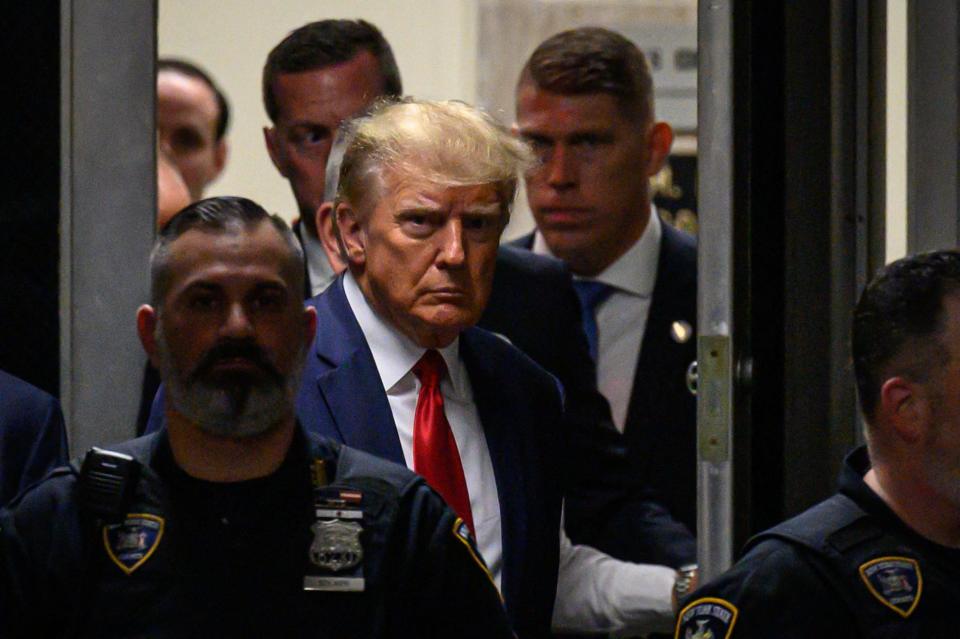Taking Trump off the ballot in 2024? Minnesota Supreme Court grapples with the issue
- Oops!Something went wrong.Please try again later.
WASHINGTON − The attorney for a liberal group seeking to keep Donald Trump off the ballot in 2024 told Minnesota's highest court Thursday that the former president "engaged in rebellion and insurrection" against the United States and is therefore barred from running again under a Civil War-era clause of the 14th Amendment.
The provision at issue "protects the republic from oath-breaking insurrectionists because its framers understood that if they're allowed back into power, they will do the same or worse," Ronald Fein, legal director for a group called Free Speech For People told the state justices in a case that is likely bound for the U.S. Supreme Court.
Minnesota's high court heard one of two high-profile election challenges to Trump's eligibility unfolding this week, part of a push to keep the Republican off state ballots for his role in inciting the Jan. 6, 2021, attack on the U.S. Capitol. The other is taking place in Colorado, where a judge in Denver is overseeing a week-long trial hashing out some of the same questions about the meaning of the Constitution's little-tested insurrection clause.
An attorney for Trump, Nicholas Nelson, told the justices in Minnesota that the question of who should be president is one best left to the voters, not to courts.
"The Constitution itself devotes more words and more provisions to how we decide that question than just about any other," he said. "It's for that reason that when parties ask the courts to step into that process and to decide who can or can't be president, the courts overwhelmingly say that's not a decision that should be made in the judiciary."
Transgender rights: Legal fight over gender-affirming care reaches the Supreme Court. Here's what's next.
It's an argument that seemed to gain some traction with at least some of Minnesota's justices.
Many other constitutional provisions involving eligibility, "seem to suggest that there is a fundamental role for Congress to play and not the states," said Minnesota Chief Justice Natalie Hudson. "It's that interrelation that I think is troubling, that suggests that this is a national matter for Congress to decide."
Trump, who faces federal and criminal trials in Washington, D.C., and Atlanta over his 2020 activities, has described the anti-ballot legal fight as an extension of 2024 politics from his enemies. Trump's attorneys argue that the issue is a political question of the kind courts often seek to avoid.
The clause at issue has only been used a handful of times since immediately after the Civil War. Trump’s lawyers contend that it was never meant to apply to the office of president, which is not mentioned in the text, unlike “Senator or Representative in Congress” and “elector of President and Vice President.”
Section 3 of the 14th Amendment says that no one can hold federal office who "having previously taken an oath, as a member of Congress, or as an officer of the United States...shall have engaged in insurrection or rebellion against the same, or given aid or comfort to the enemies thereof."
The Minnesota court must first answer some procedural, threshold questions in the case − namely, whether it has jurisdiction to decide the matter. The justices will have to wrestle with those matters first before delving into more substantial questions about the definition of the term "insurrection." The timing for a decision is not clear but state officials have said they will soon have to start planning ballots for Minnesota's primary election in March.
"States are looking to start printing and mailing ballots in January so these cases are moving very quickly and Minnesota might be the first state supreme court to issue a decision," said Derek Muller, a University of Notre Dame law professor. At the same time, Muller noted, the U.S. Supreme Court is not likely eager to dip into another monumental election decision as it did in Bush v. Gore after the 2000 presidential election.
"When you’re dealing with a case of this political magnitude in a contested election, I think the Untied States Supreme Court is interested in avoiding it as long as it can," Muller said.

This article originally appeared on USA TODAY: Minnesota Supreme Court ponders whether Trump can appear on ballot

